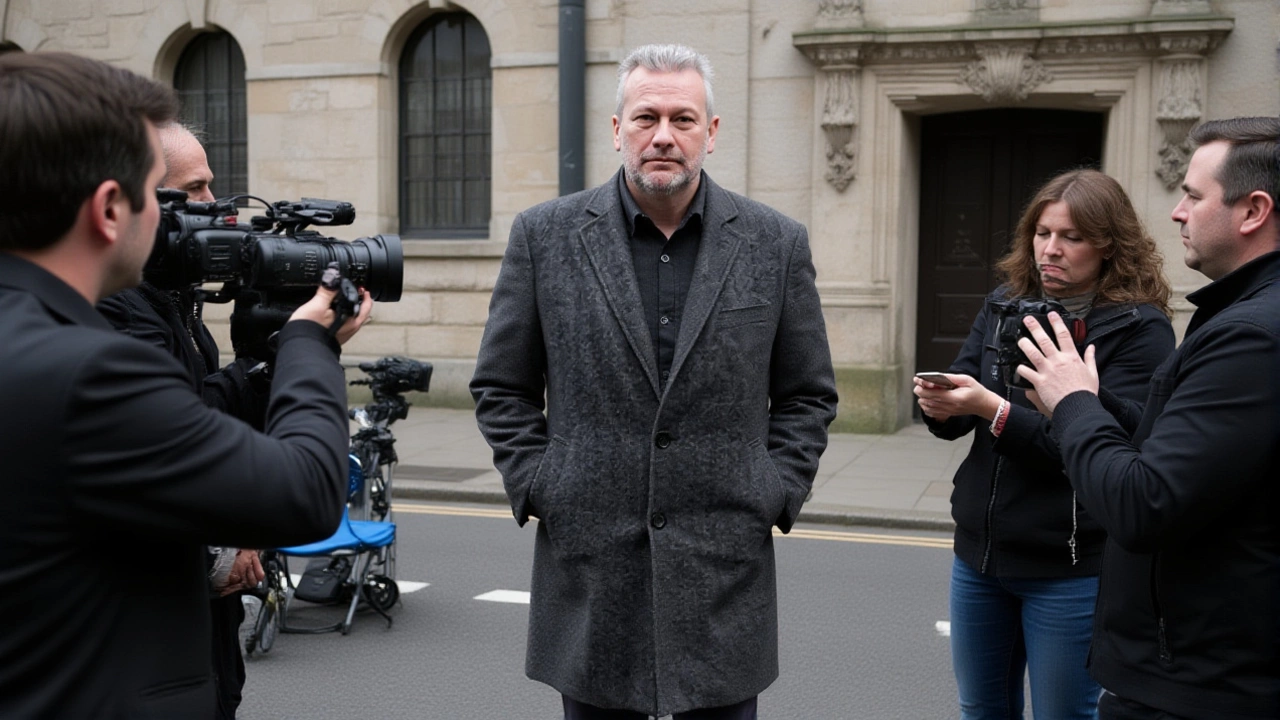When Nathan John Gill stood before a judge at London’s Old Bailey on November 21, 2025, he didn’t plead innocence—he admitted to selling his voice in the European Parliament to Moscow. For £40,000 in cash, disguised as Christmas gifts, Gill delivered Kremlin-approved scripts attacking Ukraine, undermining British foreign policy, and amplifying Russian disinformation—all while wearing the badge of a British elected official. The sentence: 10 years and 6 months. The betrayal: complete.
The Scheme That Broke the System
Between January 2018 and March 2019, Gill, then a sitting MEP and leader of Reform UK’s Welsh branch, received payments through shell companies in Cyprus and the British Virgin Islands. Each payment coincided with a speech he gave in Brussels or Strasbourg, where he repeated word-for-word lines accusing Ukraine of "systemic corruption undermining European security"—a claim contradicted by both the UK government and the European Commission. Prosecutors showed the court encrypted Telegram messages where Gill responded "Excellent" to a Russian operative’s draft speech, then later texted, "I’ve received all promised Xmas gifts." The "gifts"? Bundles of untraceable cash. The operation wasn’t subtle. Police raided Gill’s home in Conwy County Borough, North Wales, in September 2022 and found £12,850 in cash stuffed in shoeboxes and behind baseboards. Alongside it: encrypted devices linked to the Internet Research Agency, the St. Petersburg troll farm previously indicted by the U.S. for interfering in the 2016 U.S. election. The total bribe amount—£40,000—was equivalent to £52,300 in 2025 terms after inflation. Gill didn’t just take the money. He actively recruited other MEPs, though none were proven to have known they were being paid.Reform UK’s Crisis of Trust
The fallout was immediate. Reform UK, which now holds 14 seats in the House of Commons and operates 27 regional offices under leader Richard Tice, issued a statement calling Gill’s actions "reprehensible, treasonous and unforgivable." But the damage was deeper than one man’s corruption. The Prime Minister demanded an internal investigation: "How did this happen in our party? Are there others?" Nigel Farage, who once called Gill his "right-hand-man" in the Europe of Freedom and Direct Democracy group, publicly distanced himself: "I had no knowledge of what he’s called Gill’s shameful activities." Thames Valley Police confirmed Farage is not under investigation. Still, the timing is damning. Gill’s bribery spree peaked in the months before the May 2019 European elections—a critical window when Brexit Party messaging, which later became Reform UK, was aggressively pushing anti-Ukraine narratives to align with Russian interests. Analysts now wonder: Was this an isolated act… or a symptom of something wider?A Precedent Set in Stone
This is the first conviction under the UK’s 2015 Anti-Corruption Act involving foreign bribery of an elected official in an international legislative body. That matters. Until now, foreign interference cases focused on campaign donations or social media manipulation. This case proves the Kremlin isn’t just flooding Twitter—it’s paying politicians to speak in parliament. The National Crime Agency launched its probe after UK intelligence flagged irregular transfers tied to Russian influence operations. Digital forensics revealed Gill didn’t just repeat lines—he was given a playbook. Court transcripts show Russian operatives instructed him to "supply him with lines to take" on Ukraine policy. He did. Without question. Without amendment. His role as Wales’s representative meant nothing. His loyalty was for sale.
What’s Next? The Investigation Deepens
The Counter Terrorism Command is still digging. They’re examining whether Gill’s activities connect to the 2021 UK Parliamentary Russia Report, which documented "systematic" Kremlin attempts to influence Brexit-era politics. Could other politicians have been targeted? Were other parties approached? The same shell companies used to funnel Gill’s bribes were also linked to a 2017 campaign funding scandal involving a now-defunct UK think tank with ties to Moscow. Meanwhile, Reform UK faces mounting pressure. The party’s 2024 general election campaign relied heavily on anti-establishment rhetoric. Now, voters are asking: If one of their own leaders took Russian cash to smear Ukraine, who else might be compromised? The party’s headquarters at 55 Tufton Street, London, is bracing for internal audits, whistleblower calls, and possible parliamentary inquiries.Why This Isn’t Just About One Man
Gill’s case isn’t an outlier. It’s a blueprint. Russia has spent billions cultivating influence across Europe—not through tanks, but through cash, encrypted messages, and compliant politicians. In France, Italy, and Hungary, similar cases have surfaced. What’s different here? Britain prosecuted it. And won. The real question isn’t whether Gill was guilty. It’s whether the system learned anything. If we don’t overhaul how we monitor foreign payments to elected officials—if we don’t require real-time transparency for MEPs’ income streams—we’re just waiting for the next one.Frequently Asked Questions
How did Russian operatives contact Nathan Gill?
Gill communicated via Telegram channels operated by the Internet Research Agency, a St. Petersburg-based troll farm previously indicted by the U.S. Department of Justice. These channels used encrypted, burner-style accounts that masked the operatives’ identities. Evidence showed messages were sent from IP addresses linked to Russian government infrastructure, and Gill responded using devices seized during the 2022 raid on his North Wales home.
Why was the bribe amount £40,000—and how was it tracked?
The £40,000 was transferred in six installments between January 2018 and March 2019, timed to match Gill’s parliamentary speeches. Payments moved through shell companies in Cyprus and the British Virgin Islands, then were converted to cash and couriered to the UK. Financial analysts flagged the pattern as suspicious due to the precise alignment with legislative sessions. The National Crime Agency traced the flow using cross-referenced bank records and digital metadata from Gill’s seized devices.
What impact did Gill’s statements have on UK foreign policy?
Gill’s verbatim delivery of Kremlin scripts directly contradicted official UK positions supporting Ukraine’s sovereignty. His claims about "systemic corruption in Ukraine" were repeatedly debunked by the Foreign Office and EU intelligence. While his individual speeches had limited parliamentary weight, they were amplified by pro-Russian media outlets across Europe, contributing to a broader narrative that weakened Western unity on Ukraine before Russia’s 2022 invasion.
Could this happen again in British politics?
Yes—unless reforms are made. Currently, MEPs and MPs aren’t required to publicly declare all foreign income or payments from non-UK sources. Gill’s case exposed a loophole: bribes disguised as "consulting fees" or "gifts" can slip through. The Home Office is now reviewing whether to mandate real-time disclosure of all international payments to elected officials, similar to U.S. lobbying laws. Without it, the next Nathan Gill may already be in office.
What’s the connection between Gill and Nigel Farage?
Gill was widely regarded as Farage’s closest ally in the European Parliament, serving alongside him in the same political group from 2014 to 2020. But Farage claims no knowledge of the bribery. Police confirmed he is not under investigation. Still, the timing is suspicious: Gill’s most damaging speeches occurred during the 2019 Brexit Party election campaign, when Farage’s messaging was heavily focused on anti-EU and anti-Ukraine themes. Whether this was coincidence or coordination remains under scrutiny.
How does this case compare to other foreign interference cases in the UK?
Unlike past cases involving Russian-linked donations to parties or social media troll farms, this is the first time a sitting British elected official was convicted for taking direct cash bribes to influence foreign policy in an international body. It’s also the first use of the 2015 Anti-Corruption Act in this context. Previous investigations, like the 2021 Russia Report, documented influence attempts but lacked prosecutable evidence. Gill’s digital trail—text messages, cash seizures, shell company records—made conviction possible.
